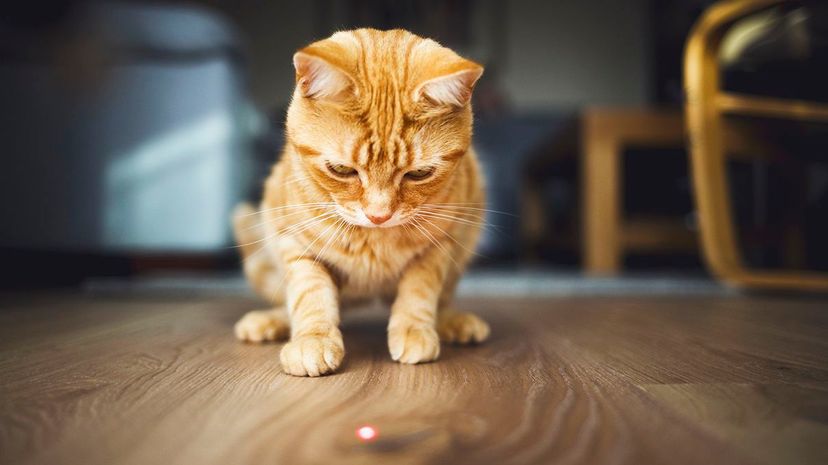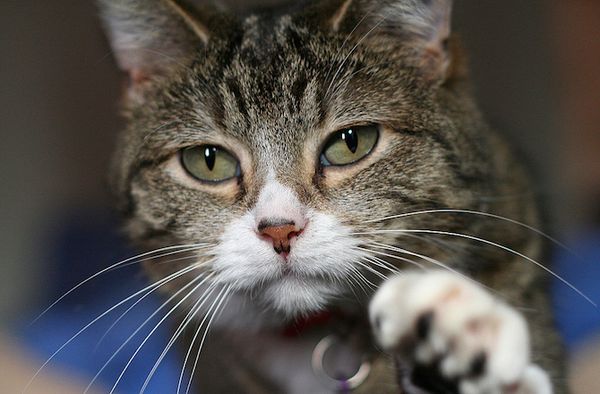
Not much in this world is quite as amusing as watching a cat freak out over the little red dot of light produced by a laser pointer. While you sit chuckling on the couch, twitching that $6 device around in your hand, your cat is experiencing real moments of heroic desperation as she leaps over the ottoman and scrambles up the wall after that tiny speck of light she's never able to catch. It's great exercise for indoor cats, but why do cats find this activity compelling?
For starters, cats are attracted to anything that allows them to stalk prey, even just for play.
Advertisement
"The laser simulates the movement of prey so it attracts the cat's attention, and gets the cat to chase and pounce on it," says Dr. Stephanie Borns-Weil, an animal behavior specialist at the Cummings Veterinary Medical Center at Tufts University. "It is certainly a play behavior in young cats — and may be in older indoor cats as well. However, it may also be an aberrant expression of the predatory behavior that is, if you will, hijacked by the laser movement."
Wild cats, feral cats, and even your sweet, spoiled indoor-outdoor kittums who sleeps under the covers with you, are single-minded, solitary predators. They're wired to spend a significant portion of their waking outdoor hours stalking their food, and since indoor cats are often woefully understimulated in this regard, playing with a laser satisfies the predatory urge.
But it is just a moving point of light, insubstantial, and obviously not a mouse — cats know that, right? For many cats, the laser pointer is compelling in a way that makes you wonder if you two are at the same party. Well, in some ways, you're probably not.
"It's unlikely that cats perceive the light from a laser pointer in the same way we do, because in several ways their eyes work differently to ours," says Dr. John Bradshaw at the University of Bristol School of Veterinary Science and author of The Trainable Cat and Cat Sense. "We both have eyes that point forwards, giving us similar abilities in perceiving how far away something is, but the similarities pretty much end there."
According to Bradshaw, although cats react strongly to the red dot produced by a laser pointer, it almost certainly doesn't have anything to do with the color. That's because cat eyes are not sensitive to the color red, so they most likely see the dot of light as white or yellow.
Secondly, their eyes connect to their brains differently than ours, which makes them more sensitive to movement.
"I suspect that this is the main attraction of the pointer," says Bradshaw. "For the cat, the movement is really exciting, and even when we think we're holding the pointer steady, the slight tremble in our hands probably generates enough movement to keep the cat interested."
So, a laser pointer interests kitties, obviously, because it gives them something compelling to hunt and play with. But some veterinarians think laser playtime it might be psychologically taxing for a cat, as it has them constantly chasing after something they'll never be able to catch. Some vets say this can lead to neurosis, which can lead to symptoms like over-grooming, but Bradshaw thinks not.
"I don't agree that using a laser pointer to amuse your cat will make it neurotic. Cats 'hunt' their toys all the time," Bradshaw says, "and the fact that they never actually succeed in 'killing' any of them doesn't seem to do the cat any harm. There may be a few cats that become obsessed with laser pointers, and for those it would probably be best to ration their exposure, but for the average moggy, a few minutes of chasing a red dot round the apartment should simply provide some of the mental and physical stimulation that indoor cats, especially, need."
Borns-Weil agrees that the main concern should not be what you're using to exercise your indoor cat, so much as whether you're doing it at all:
"Insufficient stimulation is a serious problem for indoor cats," she says. "Cats are highly territorial, solitary hunters that spend much of their days foraging for small prey animals. I am not advocating letting them outside to be killed by predators or hit by cars, but I do advocate managing their environment as one does any captive wild animal so that they have the opportunity to do what they have evolved to do."
"Regular opportunities for predatory play and exercise, feeding with foraging toys, safe opportunities to monitor wildlife from window seats, plenty of vertical space and hiding spots," she explains, "should all be part of a cat's environment. Cats are not — or rather should not be — low-maintenance pets. To keep a cat requires effort and understanding to be able provide a satisfactory life in an indoor context. I think that laser play can be included in an overall plan of enrichment."
Advertisement

